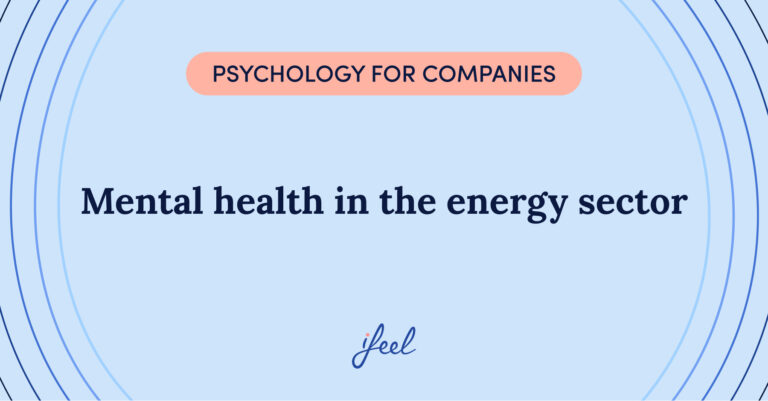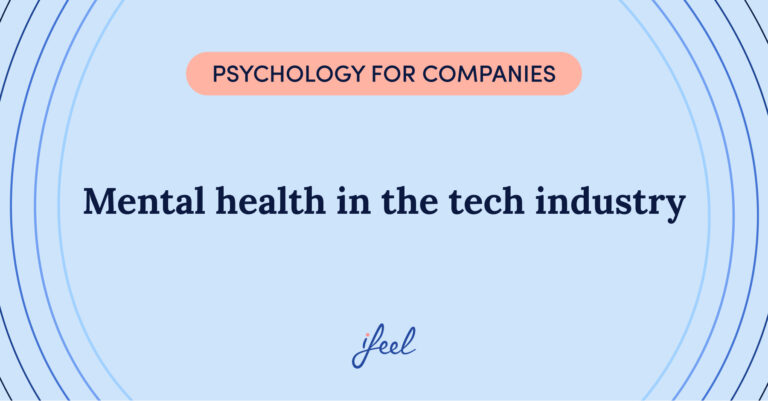In today’s hectic and demanding work environment, the consequences for mental well-being are becoming increasingly evident. The increase in mental health sick leave in the UK in recent years has recently been documented by a staggering statistic revealing that mental ill-health now accounts for more than half of all work-related illnesses. Studies show that 51% of long-term sick leave is directly attributed to stress, depression, or anxiety.
In this article, we will discuss the consequences of the increase in mental health sick leave, both for the employee and the company. Moreover, we will also analyse the psychosocial risk factors which emerge from this silent epidemic. Keep reading to find out more.

Psychological risk factors due to an increase in mental health sick leave
The following table describes various psychological risk factors that people may encounter in the workplace, shedding light on potential challenges to mental well-being leading to an increase in mental health sick leave.
| Psychological Risk Factor | Description |
| Stress at work | High job demands, pressure, tight deadlines, lack of support, interpersonal conflicts. |
| Job insecurity | Fear of job loss, job instability, and frequent changes in job responsibilities. |
| Lack of recognition | Absence of acknowledgment and rewards for work, lack of professional development opportunities. |
| Technological challenges | Rapid technological advances, lack of technological skills, and increased workload due to technology. |
| Toxic corporate culture | Lack of transparency, poor communication, lack of healthy organisational values. |
| Burnout | Long working hours, lack of balance between work and personal life. |
| Lack of resources and psychological support | Insufficient resources to perform the job, lack of training, and no mental health support from the company. |
Preventing the increase in mental health sick leave
Medical leave due to a sudden physical health problem (an urgent operation, an injury followed by recovery, an unexpected illness requiring rest or isolation) is challenging to prevent, if not inevitable.
Meanwhile, maternity or paternity leave is entirely foreseeable, but it is also necessary and positive for the babies, their parents, and, ultimately, the company where they work. However, the increase in mental health sick leave should be seen as a cause for concern and should be prevented.
The increasing destigmatization of mental health problems and the implementation of psychological therapy are making it easier for many employees to “come out of the closet” of these difficulties and take leave from work.
Such leave is a valuable resource for those who need it and should be used in such cases. However, they can also be seen as an extreme solution regarding economic cost for companies and the health conditions of the people who take them.
High economic cost
Each sick leave in itself and, to a greater extent, the increase in sick leave due to mental health represents a measurable, high, and growing economic cost for any company but, above all, for some. Which ones? Those companies that do not adequately invest their resources in prevention programs, for example, through global emotional well-being services for companies.
The idea is to combine different tools and actions (use of resources in an app, training and coaching, awareness, emotional support, and online therapy…). This type of strategy can help to detect possible situations of burnout within the team, a psychological condition that can become complicated and require a sick leave due to stress or depression, for example, if it is not treated in time.
A tool for saving money
Having a corporate well-being program for companies is an increasingly widespread option among organizations in all sectors, as it is a genuinely efficient tool for approach and prevention of an increase in mental health sick leave. ¡
In this way, it is also possible to save human and economic costs due not so much to an increase in sick leave due to mental health but to possible misuse of this same instrument: waiting too long to take advantage of them and doing so when the health problem has worsened, using them in cases where it is not necessary, extending them in time below or above what is necessary.
It should be borne in mind that, in general, after an absence of this type, it is necessary to return to work after a period of sick leave. This also involves a significant energy expenditure for both the employee and the company. Therefore, the training mentioned above, awareness-raising, and professional advice are particularly useful.

Prioritizing team members’ well-being
A particular corporate mindset must accompany companies’ attempts to control the increase in mental health sick leave to be successful. Such an approach must understand employees’ physical and psychological well-being as a continuum to be respected. Understanding that work should not cause significant psychological distress or disrupt a person’s good self-care habits is fundamental to the well-being of individuals and the success of companies.
This is the approach we take at ifeel, and we propose it to our partner companies. They need tools to analyze in detail the causes and consequences of the increase in mental health-related sick leave. They also need advice on how to deal with them. After all, workers’ mental health problems must be interpreted as a critical risk factor for the efficient management and sustainability of companies.
To help organizations in this process, our team of psychologists, experts in well-being at work, has created an emotional well-being service for companies aimed at the entire team, including Human Resources managers.
That’s why, through our service, you can receive personalized, data-driven advice on improving your teams’ psychological well-being. Are you part of your organization’s Human Resources department? Try our program now and find out how it could help you.
In addition, this program offers all employees a complete mental health care service that they can access in different ways depending on their needs. Those who wish can access an online therapy service with one of our psychologists, specialized in cases like theirs, or interact with one of our professionals to receive emotional support in a more specific circumstance that concerns them.
Of course, in our Resources section, you can find different materials, such as podcasts, HR Guides on various topics (e.g., employee experience or how to design a good HR strategy), or interviews with important HR positions. In addition, we have a Psychosocial Risk Factors Template, which you can use to comply with the requirements of the Labor Inspectorate.
We hope you found this post about the increase in mental health sick leave interesting. If you would like more information about our emotional well-being program for companies, ask us, and we will contact your team as soon as possible.











